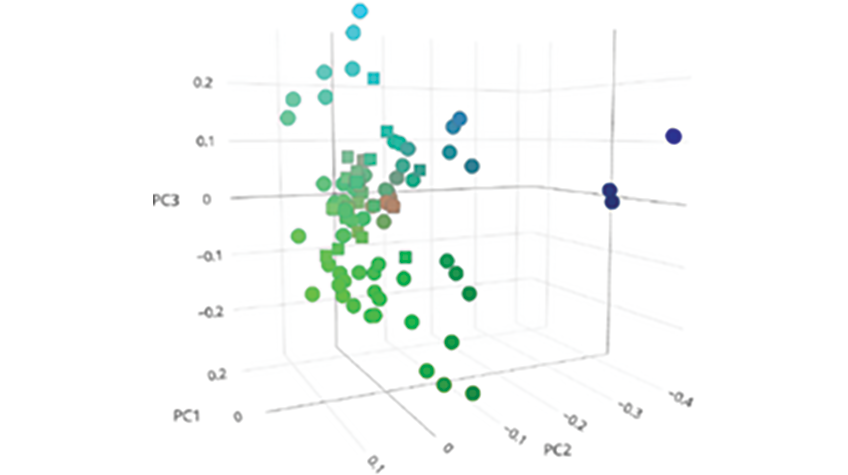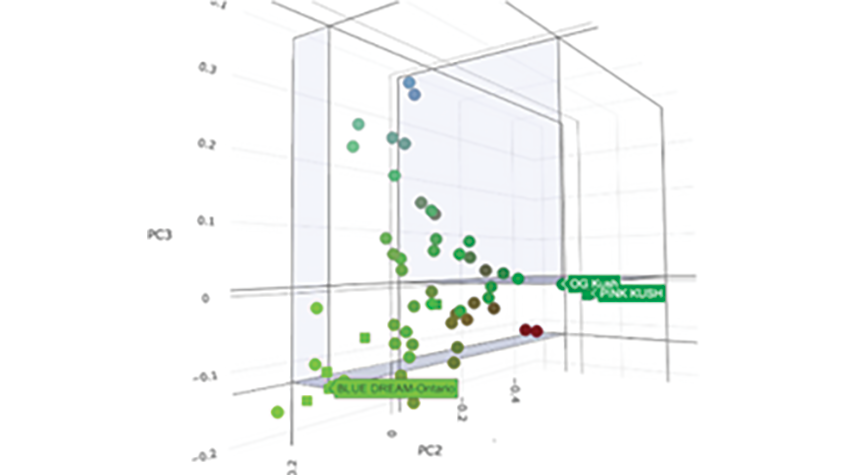DNA Genotyping

CQA DNA Genotyping allows correlation of the plant’s chemical composition with outcomes from the lab testing and our blind tasting panel.
CQA integrates sensory analysis, lab testing to profile a particular product and genotyping to identify multivariate associations underlying quality indicators and provide comparative information to the consumer as well to licensed producers and nurseries.

PCA 2D - Two dimensions:
This Principal Component Analysis (PCA) may use thousands of variations in the genome to find the genetic features that best differentiate samples. Samples that are farther apart in the plot are more genetically different while samples that are closer together are more similar.
An efficient comparison of cultivars, providing compressed visualization in either two (2D) or three (3D) dimensions of the differences and similarities between all individuals within a population, allowing to identify clusters of high relatedness, membership within subpopulations and genetic outliers. Clones are revealed and cultivars ranked by genetic stability, shared ancestry and other key metrics.
Traits such as high terpene synthesis, high THC synthesis or disease resistance can be identified within plant populations or a sample of dried flower. CQA can also identify reliable consumer outcomes such as pleasant aroma based on a leaf sample from a vegetative plant.
The CQA Quality Genomic Assay will identify the best performing individuals from large or small populations of plants with respect to both genetic traits and consumer sentiment.
This CQA integration of sensory analysis, lab testing and genotyping are useful to our information to the general public of a CQA certified product as well as the producers.
For example, if the CQA Genotyping confirms that the genotype of the candidate is similar to other versions but the CQA sensory panel does not yield a favorable evaluation, this information allow to consult with the producer team on how to make improvements, based on the comments from the sensory panel. A contrario, with a favorable sensory but a dissimilar genotype, CQA will offer to consult with their team on how to approach the market with this offering.

PCA 3D – Three dimensions:
The PCA technique under 3D illustration reflects a more complex analysis by linearly transforming the data into a new more precise coordinate system.
CQA has its own genotype database and has also acquired a selected genotype database from a third party. This allows a proximity of samples to reference cultivars. Every sample tested is added to the CQA database.
Genomic data allows for unique insight into cryptic traits that are not available to the naked eye/nose. Such insight include male/female trait, pathogen resistance (such as powdery mildew resistance or susceptibility), length of flowering period.
Genomic data is able to predict chemotypes (terpene, cannabinoid etc) profiles from seed or vegetative plants (conventional analytical chemistry requires mature and cured flower to generate chemotype data).
Our Genotyping service also allow producers and nurseries to conduct preliminary phenotype within a week of sprouting a seed as opposed to months of cultivation.
Lastly, genomic data offers a unique traceability means, enabling to unique barcodes to be generate to the level of individual clones and their ability to identify SKUs in the market with the same name that are not identical clones but rather sibling or closely related albeit not identical accessions unique to individual producers.
